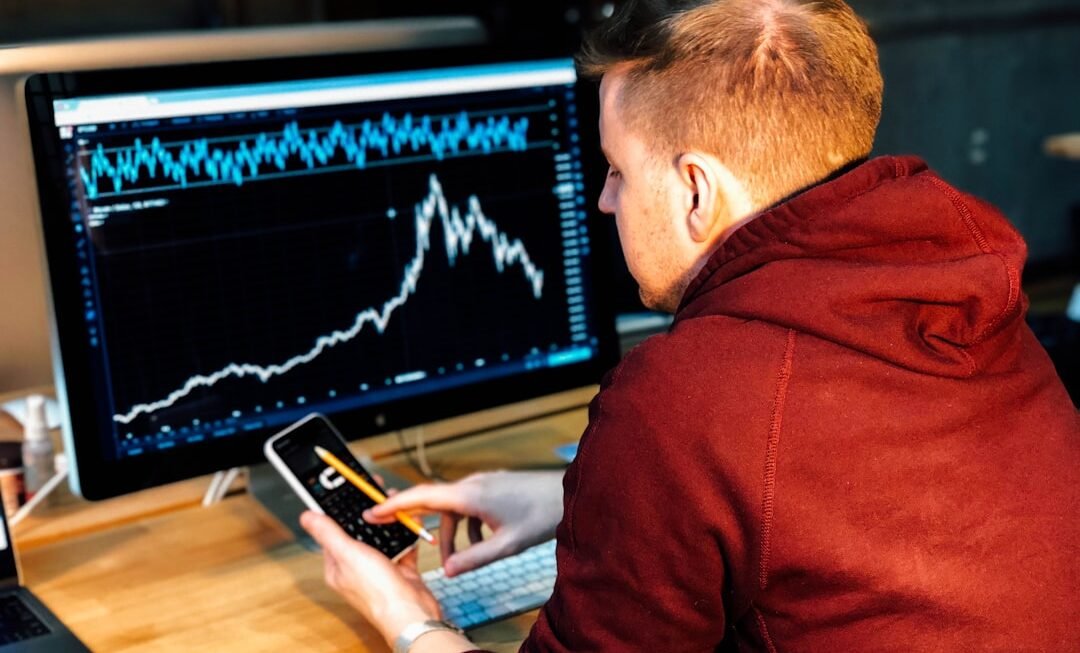In recent years, the financial landscape has undergone a significant transformation, largely driven by technological advancements. Among these innovations, mobile trading apps have emerged as a pivotal tool for investors and traders alike. These applications allow users to engage in trading activities directly from their smartphones or tablets, providing unprecedented access to financial markets.
The rise of mobile trading apps can be attributed to the increasing demand for flexibility and immediacy in trading, as well as the growing number of individuals interested in managing their investments independently. Mobile trading apps have democratized access to financial markets, enabling both seasoned investors and novices to participate in trading activities with ease. The user-friendly interfaces and intuitive designs of these applications have made it possible for anyone with a smartphone to buy and sell stocks, currencies, and other financial instruments.
As a result, the barriers that once separated retail investors from institutional players have diminished, fostering a more inclusive trading environment. This article delves into the various features and benefits of mobile trading apps, highlighting their impact on the trading experience.
Accessibility and Convenience
One of the most significant advantages of mobile trading apps is their unparalleled accessibility. Users can trade from virtually anywhere, whether they are at home, commuting, or traveling abroad. This level of convenience allows traders to seize opportunities in real-time without being tethered to a desktop computer.
For instance, a trader who receives an alert about a sudden market shift can quickly execute a trade from their mobile device, capitalizing on the moment before the opportunity dissipates. Moreover, mobile trading apps often come equipped with features that enhance user experience. Many platforms offer biometric login options, such as fingerprint or facial recognition, which streamline the authentication process while maintaining security.
This ease of access encourages more frequent trading and allows users to stay engaged with their portfolios throughout the day. The ability to monitor investments on-the-go has transformed how individuals approach trading, making it a more dynamic and responsive activity.
Real-Time Market Updates
The fast-paced nature of financial markets necessitates timely information, and mobile trading apps excel in delivering real-time market updates. Users can access live quotes, charts, and news feeds that provide insights into market movements as they happen. This immediacy is crucial for traders who rely on up-to-the-minute data to make informed decisions.
For example, a trader monitoring stock prices can react swiftly to fluctuations caused by economic reports or geopolitical events, ensuring they are not left behind in a rapidly changing environment. Additionally, many mobile trading apps offer customizable alerts that notify users of significant price changes or market events. This feature allows traders to set specific parameters for their investments, ensuring they are alerted when conditions meet their criteria.
By receiving real-time updates and alerts directly on their devices, traders can maintain a competitive edge and make strategic decisions based on the latest information available.
Customization and Personalization
Mobile trading apps have evolved to offer a high degree of customization and personalization, catering to the unique preferences of individual users. Traders can tailor their dashboards to display the information that matters most to them, whether it be specific stocks, indices, or commodities. This level of personalization enhances the user experience by allowing traders to focus on their areas of interest without being overwhelmed by irrelevant data.
Furthermore, many apps provide users with the ability to create watchlists that track selected securities. This feature enables traders to monitor their favorite stocks or assets closely, facilitating quicker decision-making when it comes time to execute trades. The ability to customize alerts based on personal trading strategies further enhances this experience, allowing users to receive notifications that align with their investment goals.
As a result, mobile trading apps empower users to create a tailored trading environment that suits their individual needs.
Enhanced Security Features
As mobile trading apps gain popularity, security has become a paramount concern for both developers and users. To address these concerns, many applications incorporate advanced security features designed to protect sensitive financial information. Two-factor authentication (2FA) is one such measure that adds an extra layer of security by requiring users to verify their identity through a secondary method, such as a text message or authentication app.
In addition to 2FA, encryption technologies are employed to safeguard data transmitted between the user’s device and the trading platform. This ensures that sensitive information remains confidential and secure from potential cyber threats. Some apps also offer features like session timeouts and automatic logouts after periods of inactivity, further enhancing security measures.
By prioritizing user safety through robust security protocols, mobile trading apps instill confidence in users as they navigate the complexities of financial markets.
Integration with Social Media
The integration of social media features within mobile trading apps has revolutionized how traders interact with one another and share insights. Many platforms now allow users to connect with fellow traders through social networks or built-in community forums. This connectivity fosters collaboration and knowledge sharing among users, enabling them to discuss strategies, market trends, and investment opportunities in real-time.
Social trading features have gained traction as well, allowing users to follow successful traders and replicate their strategies. For instance, platforms may offer leaderboards showcasing top-performing traders, enabling others to learn from their approaches. This social aspect not only enhances the overall trading experience but also creates a sense of community among users who share similar interests in financial markets.
By leveraging social media integration, mobile trading apps facilitate a collaborative environment that encourages learning and growth.
Advanced Analytical Tools
To make informed trading decisions, investors require access to advanced analytical tools that provide insights into market trends and asset performance. Mobile trading apps have increasingly incorporated sophisticated analytical features that empower users to conduct thorough research on potential investments. These tools often include technical analysis indicators such as moving averages, Bollinger Bands, and Relative Strength Index (RSI), which help traders identify patterns and make predictions about future price movements.
Moreover, many apps offer charting capabilities that allow users to visualize data over various timeframes. Traders can analyze historical price movements alongside current trends to develop strategies based on empirical evidence rather than speculation. Some platforms even provide access to proprietary research reports and market analysis from financial experts, further enhancing the decision-making process for users.
By equipping traders with advanced analytical tools, mobile trading apps enable them to approach the markets with greater confidence and precision.
Seamless Trading Execution
The efficiency of trade execution is critical in the fast-paced world of finance, where every second counts. Mobile trading apps are designed to facilitate seamless trade execution, allowing users to place orders quickly and efficiently. Many platforms offer one-click trading options that enable users to execute trades with minimal friction, reducing the likelihood of missed opportunities due to delays.
Additionally, mobile trading apps often support various order types, including market orders, limit orders, and stop-loss orders.
The ability to modify or cancel orders directly from the app further enhances user control over their trades.
By streamlining the execution process and providing diverse order options, mobile trading apps ensure that users can navigate the markets with agility.
Educational Resources and Tutorials
For many individuals venturing into the world of trading for the first time, education is key to success. Recognizing this need, many mobile trading apps have integrated educational resources and tutorials designed to help users build their knowledge base. These resources often include articles, videos, webinars, and interactive courses covering various topics related to trading strategies, market analysis, and risk management.
By providing access to educational materials directly within the app, developers empower users to learn at their own pace while engaging with practical content relevant to their trading journey. Some platforms even offer simulated trading environments where users can practice executing trades without risking real capital. This hands-on approach allows novice traders to gain confidence before entering live markets.
The emphasis on education within mobile trading apps reflects a commitment to fostering informed investors who can navigate financial markets effectively.
Community and Networking Opportunities
The rise of mobile trading apps has not only transformed individual trading experiences but has also created opportunities for community building among traders. Many platforms feature forums or chat rooms where users can engage in discussions about market trends, share insights, and seek advice from peers. This sense of community fosters collaboration and support among traders who may be navigating similar challenges or pursuing common goals.
Networking opportunities extend beyond online interactions; some mobile trading apps organize events or webinars where users can connect with industry experts and fellow traders in person or virtually. These gatherings provide valuable insights into market dynamics while allowing participants to expand their professional networks within the finance community. By facilitating connections among traders through community features and networking events, mobile trading apps contribute to a more vibrant ecosystem where knowledge sharing thrives.
Future Trends in Mobile Trading Apps
As technology continues to evolve at an unprecedented pace, the future of mobile trading apps promises exciting developments that will further enhance user experiences. One emerging trend is the integration of artificial intelligence (AI) and machine learning algorithms into trading platforms. These technologies can analyze vast amounts of data in real-time, providing personalized recommendations based on individual user behavior and market conditions.
As blockchain technology gains traction, we may see more platforms incorporating decentralized exchanges (DEXs) that allow users to trade directly from their wallets without intermediaries. This shift could enhance transparency while reducing transaction costs for users.
Furthermore, advancements in augmented reality (AR) and virtual reality (VR) could revolutionize how traders interact with market data and execute trades. Imagine being able to visualize complex data sets in an immersive environment or using AR tools to overlay market information onto physical spaces for enhanced decision-making. In conclusion, mobile trading apps are poised for continued growth and innovation as they adapt to changing user needs and technological advancements.
The future holds immense potential for these platforms as they strive to provide even more robust features that empower traders in an increasingly dynamic financial landscape.
FAQs
What are mobile trading apps?
Mobile trading apps are applications that allow users to trade stocks, currencies, commodities, and other financial instruments using their smartphones or tablets. These apps provide access to real-time market data, trading tools, and account management features.
How are mobile apps changing the online trading experience?
Mobile apps are changing the online trading experience by providing users with the ability to trade on the go, access real-time market data, receive push notifications for price alerts, and execute trades quickly and efficiently from anywhere with an internet connection.
What are the benefits of using mobile trading apps?
Some benefits of using mobile trading apps include the ability to monitor and manage trades in real time, access to a wide range of trading tools and resources, and the convenience of being able to trade from anywhere at any time.
Are mobile trading apps secure?
Most reputable mobile trading apps use advanced security measures such as encryption, two-factor authentication, and biometric authentication to protect users’ personal and financial information. It’s important for users to choose a trusted and regulated broker when using a mobile trading app.
Can I use mobile trading apps on multiple devices?
Many mobile trading apps are designed to be used on multiple devices, such as smartphones and tablets, as long as the user has a valid account with the broker and the app is downloaded and installed on each device.












